Guest blogged by Ernest A. Canning
 Recently, The BRAD BLOG criticized the undemocratic features of the new "Top Two" open primary system (aka the "Cajun Primary") in California. The new system, approved via a ballot initiative in 2010, changes the state's primary to system to allow a single, open primary in which the two candidates who receive the highest numbers of votes, go on to face each other in the November general election even if the combined totals of the 'Top Two' do not amount to a majority of votes cast in the primary.
Recently, The BRAD BLOG criticized the undemocratic features of the new "Top Two" open primary system (aka the "Cajun Primary") in California. The new system, approved via a ballot initiative in 2010, changes the state's primary to system to allow a single, open primary in which the two candidates who receive the highest numbers of votes, go on to face each other in the November general election even if the combined totals of the 'Top Two' do not amount to a majority of votes cast in the primary.
In our critique, we cited the race for the newly created CA-26 Congressional seat where, despite a Democratic Party voter registration advantage, come November, voters may be forced to choose between a 'Tea Party' Republican and a stealth Republican who changed her party registration to independent just days prior to the candidate filing deadline because the two are matched against four Democrats on the June 5 "Top Two" primary ballot.
Our analysis drew criticism in comments from some right-leaning readers claiming our critique was simply a case of sour grapes by a progressive author. But, the state's upcoming U.S. Senate race reveals that the undemocratic potential of the 'Cajun Primary' cuts both ways; that there is a distinct possibility that all Californians, come November, will be forced to choose between the incumbent corporate Democratic Sen. Diane Feinstein, and the Occupy Wall Street-connected, computer scientist David Levitt (see video below), who is also a Democrat...
Again a numbers game
Where the numbers in the CA-26 race --- four Democrats vs. one Republican and a stealth Republican running as an independent --- favor the GOP, the CA U.S. Senate primary, in which six Democrats are competing with fourteen Republicans, two Peace & Freedom Party candidates, one American Independent Party candidate and one Libertarian candidate, provides a very good chance that none of the GOP candidates will end up qualifying for the November ballot this year.
As Levitt explains at his campaign website:
The Republicans often endorse and fund one strong candidate. But this year, thanks to Senator Feinstein's strength, they didn't bother. They endorsed a candidate who has been tied for last place among Republicans. And actually, the best known Republican in the race is proud to be known as the Queen of the Birthers: Orly Taitz has been questioning the president's birth certificate and fighting to have him removed from the Presidential ballot.
If his appearance at a recent GOP debate in San Mateo provides any indication, Levitt may well garner support from rank-and-file Republicans as well as progressive Democrats and Independents.
In describing the debate, Levitt writes:
But when I spoke, without rancor or partisanship, challenging their party's conventional wisdom and the other speakers' misleading misstatements and with hard facts, they listened with rapt attention and concluded with a round of applause.
The two videos of that debate (posted below) lend credence to Levitt's self-assessment of his performance.
Classic corporate vs. progressive Democratic general election?
"Instead of wasting trillions on war and giving $7 trillion for too-big-to-fail banks to gamble with as we have the past 4 years, we need to invest in education, infrastructure, and 21st century energy jobs," Levitt says in defining his positions.
Those positions stand in stark contrast to Feinstein, whose husband, Richard Blum, made millions off the Iraq war. Feinstein supported the 2002 Iraq war resolution, warned Republicans not to oppose Bush's Iraq troop escalation in 2007, co-sponsored the USA PATRIOT Act, joined Republicans in voting to limit the scope of privacy protections in the Foreign Intelligence Surveillance Act, and supported the Obama administration's troop escalation in Afghanistan.
Levitt, on the other hand, calls for an immediate end to the DOE/DOJ raids on CA medical marijuana clinics and for a single-payer Medicare-for-All healthcare system. He not only decries the fraudulent Wall Street schemes that led to the 2008 economic meltdown, but calls for specific solutions, including a break up of the big banks, prosecutions of bank and rating agency executives, restoration of Glass-Steagall, and "a moratorium on foreclosures and evictions by any bank that received bail outs or low interest Fed loans."
Back in 1998, Feinstein was amongst the group of Senate Democrats who opened the door to the Wall Street credit default swaps casino by voting to repeal Glass-Steagall, the Great Depression era banking reform that, for decades, had disallowed investment firms from gambling with the funds of private depositors held in commercial banks.
In an email exchange, Levitt, who says he admires Sen. Bernie Sanders (I-VT), informed The BRAD BLOG that he not only opposes the infamous Citizens United decision but supports Vermont's proposed Constitutional Amendment which would end corporate personhood and establish that money does not equate to free speech under the First Amendment.
Should Levitt succeed in achieving the second highest primary vote totals in next week's CA primary election, this could potentially create a far more significant challenge to Feinstein than any that could be mustered by a Republican --- provided Levitt's substantive positions could cut through the cloud of paid-for political propaganda that only corporate money can buy.
As revealed by an October 9, 2011 Time Magazine poll 89% of Americans agree that Wall Street exerts too much influence on our political system, 79% believe the gap between rich and poor is too large, and 71 percent wanted prosecutions for "executives of financial institutions responsible for the financial meltdown in 2008". Other polls reveal that 83% of Americans oppose Citizens United.
A March 2012 Rassmussen poll revealed that 53% of likely U.S. voters supported an immediate and complete withdrawal from Afghanistan, as compared to only 31% who are opposed. Polls taken during the healthcare debate revealed that, at the end of 2009, 2/3 of all Americans supported a single-payer, Medicare-for-All healthcare system.
Thus, in this instance, the 'Cajun Primary' system may reduce what Noam Chomsky describes as "the democracy deficit" by providing voters the ability to choose between candidates whose substantive differences may be far greater than those which would otherwise be presented by a traditional Republican/Democratic electoral contest.
That said...
It's still undemocratic
While, from a progressive standpoint, the numbers game under the upcoming U.S. Senate primary raises the possibility of a progressive vs. corporate Democratic general election that may offer voters a rare opportunity to escape the "lesser evil" paradigm, it could still deprive Republicans, members of third parties and true independents of the ability to choose anyone other than a Democrat to represent the entire state in the U.S. Senate come November.
The one saving grace is that where the GOP has used the deceptive and substance-free campaign of the stealth Republican, Linda Parks, in seeking a run-off between two GOP candidates who represent a minority of CA-26 voters, as discussed last week, the CA U.S. Senate race may provide a unique opportunity for a candidate who represents the policies of a vast majority of the citizenry to confront the status quo.
As the options for democracy have generally been narrowing over the past 30 years, one ironic element of the first "Top Two" primary in CA could be a greater contrast of candidates, albeit by members of the very same party.
David Levitt campaign video follows...
San Mateo GOP Senate debate video containing troubling, radical-right candidate statements follows…
Video reflecting Levitt’s remarks at San Mateo GOP Senate debate…
Ernest A. Canning has been an active member of the California state bar since 1977. Mr. Canning has received both undergraduate and graduate degrees in political science as well as a juris doctor. He is also a Vietnam vet (4th Infantry, Central Highlands 1968). Follow him on Twitter: @Cann4ing.


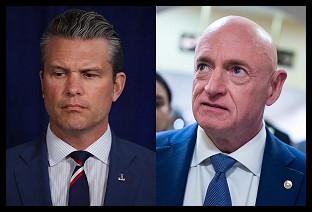 Court Blocks Hegseth Censure of Sen. Mark Kelly
Court Blocks Hegseth Censure of Sen. Mark Kelly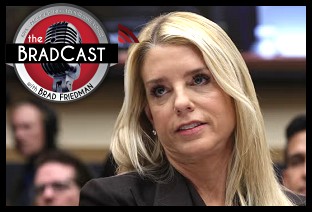 Harpy Tantrums, Legal Losses, Election Fails, Retreating ICE and Other Hopeful Signs: 'BradCast' 2/12/26
Harpy Tantrums, Legal Losses, Election Fails, Retreating ICE and Other Hopeful Signs: 'BradCast' 2/12/26 'Green News Report' 2/12/26
'Green News Report' 2/12/26
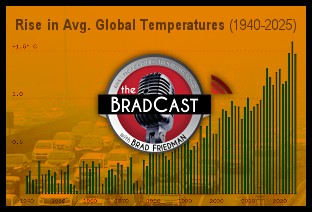 'Let Kids with Asthma Suffer': Trump to Reverse EPA's Landmark 'Endangerment Finding': 'BradCast' 2/11/26
'Let Kids with Asthma Suffer': Trump to Reverse EPA's Landmark 'Endangerment Finding': 'BradCast' 2/11/26 Trump's Presidency Now About Little More Than Racism, Corruption, Culture War Nonsense: 'BradCast' 2/10/26
Trump's Presidency Now About Little More Than Racism, Corruption, Culture War Nonsense: 'BradCast' 2/10/26 'Green News Report' 2/10/26
'Green News Report' 2/10/26 About Trump's FBI Raid of the Fulton County, GA Elections Warehouse: 'BradCast' 2/9/26
About Trump's FBI Raid of the Fulton County, GA Elections Warehouse: 'BradCast' 2/9/26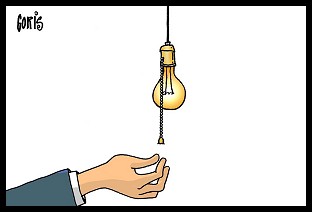 Sunday 'Dead in Darkness' Toons
Sunday 'Dead in Darkness' Toons 'New START' Treaty Allowed to End Amid New World Disorder: 'BradCast' 2/5/26
'New START' Treaty Allowed to End Amid New World Disorder: 'BradCast' 2/5/26 'Green News Report' 2/5/26
'Green News Report' 2/5/26 Trump Turns 'War on Terror' Tools Against Domestic Political Foes: 'BradCast' 2/4/26
Trump Turns 'War on Terror' Tools Against Domestic Political Foes: 'BradCast' 2/4/26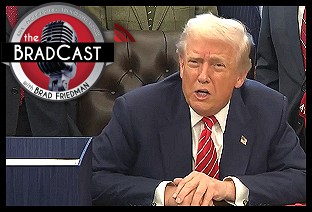 Losing Legally and Politically, Trump Threatens to 'Nationalize' Elections: 'BradCast' 2/3/26
Losing Legally and Politically, Trump Threatens to 'Nationalize' Elections: 'BradCast' 2/3/26 'Green News Report' 2/3/26
'Green News Report' 2/3/26 Bad and Good Bunnies, and an Electoral Shock in Deep 'Red' TX: 'BradCast' 2/2/26
Bad and Good Bunnies, and an Electoral Shock in Deep 'Red' TX: 'BradCast' 2/2/26 Sunday 'Mirror, Mirror' Toons
Sunday 'Mirror, Mirror' Toons 'Green News Report' 1/29/26
'Green News Report' 1/29/26 It's About Elections and the Windmills of His Mind: 'BradCast' 1/29/26
It's About Elections and the Windmills of His Mind: 'BradCast' 1/29/26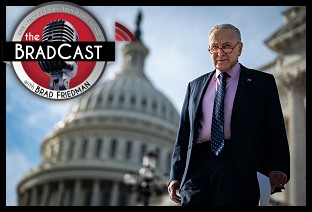 Govt Shutdown Over ICE Funding Near Certain This Weekend: 'BradCast' 1/28/26
Govt Shutdown Over ICE Funding Near Certain This Weekend: 'BradCast' 1/28/26 Trump Blinks, Bovino Out, MN Op Falters, Persists as Midterms Loom: 'BradCast' 1/27
Trump Blinks, Bovino Out, MN Op Falters, Persists as Midterms Loom: 'BradCast' 1/27  The ICE Murder of ICU Nurse Alex Pretti and the Heroes of Mpls: 'BradCast' 1/26/26
The ICE Murder of ICU Nurse Alex Pretti and the Heroes of Mpls: 'BradCast' 1/26/26  The BRAD BLOG: 22 Years and Still Counting
The BRAD BLOG: 22 Years and Still Counting Mr. Smith Testifies (Publicly) in Washington: 'BradCast' 1/22/26
Mr. Smith Testifies (Publicly) in Washington: 'BradCast' 1/22/26 World Turning Against Self-Destructing U.S. Under Trump: 'BradCast' 1/21/26
World Turning Against Self-Destructing U.S. Under Trump: 'BradCast' 1/21/26 Trump Waste, Fraud, Abuse on Voting, at DOJ, by DOGE: 'BradCast' 1/20/26
Trump Waste, Fraud, Abuse on Voting, at DOJ, by DOGE: 'BradCast' 1/20/26
 VA GOP VOTER REG FRAUDSTER OFF HOOK
VA GOP VOTER REG FRAUDSTER OFF HOOK Criminal GOP Voter Registration Fraud Probe Expanding in VA
Criminal GOP Voter Registration Fraud Probe Expanding in VA DOJ PROBE SOUGHT AFTER VA ARREST
DOJ PROBE SOUGHT AFTER VA ARREST Arrest in VA: GOP Voter Reg Scandal Widens
Arrest in VA: GOP Voter Reg Scandal Widens ALL TOGETHER: ROVE, SPROUL, KOCHS, RNC
ALL TOGETHER: ROVE, SPROUL, KOCHS, RNC LATimes: RNC's 'Fired' Sproul Working for Repubs in 'as Many as 30 States'
LATimes: RNC's 'Fired' Sproul Working for Repubs in 'as Many as 30 States' 'Fired' Sproul Group 'Cloned', Still Working for Republicans in At Least 10 States
'Fired' Sproul Group 'Cloned', Still Working for Republicans in At Least 10 States FINALLY: FOX ON GOP REG FRAUD SCANDAL
FINALLY: FOX ON GOP REG FRAUD SCANDAL COLORADO FOLLOWS FLORIDA WITH GOP CRIMINAL INVESTIGATION
COLORADO FOLLOWS FLORIDA WITH GOP CRIMINAL INVESTIGATION CRIMINAL PROBE LAUNCHED INTO GOP VOTER REGISTRATION FRAUD SCANDAL IN FL
CRIMINAL PROBE LAUNCHED INTO GOP VOTER REGISTRATION FRAUD SCANDAL IN FL Brad Breaks PA Photo ID & GOP Registration Fraud Scandal News on Hartmann TV
Brad Breaks PA Photo ID & GOP Registration Fraud Scandal News on Hartmann TV  CAUGHT ON TAPE: COORDINATED NATIONWIDE GOP VOTER REG SCAM
CAUGHT ON TAPE: COORDINATED NATIONWIDE GOP VOTER REG SCAM CRIMINAL ELECTION FRAUD COMPLAINT FILED AGAINST GOP 'FRAUD' FIRM
CRIMINAL ELECTION FRAUD COMPLAINT FILED AGAINST GOP 'FRAUD' FIRM RICK SCOTT GETS ROLLED IN GOP REGISTRATION FRAUD SCANDAL
RICK SCOTT GETS ROLLED IN GOP REGISTRATION FRAUD SCANDAL VIDEO: Brad Breaks GOP Reg Fraud Scandal on Hartmann TV
VIDEO: Brad Breaks GOP Reg Fraud Scandal on Hartmann TV RNC FIRES NATIONAL VOTER REGISTRATION FIRM FOR FRAUD
RNC FIRES NATIONAL VOTER REGISTRATION FIRM FOR FRAUD EXCLUSIVE: Intvw w/ FL Official Who First Discovered GOP Reg Fraud
EXCLUSIVE: Intvw w/ FL Official Who First Discovered GOP Reg Fraud GOP REGISTRATION FRAUD FOUND IN FL
GOP REGISTRATION FRAUD FOUND IN FL

































